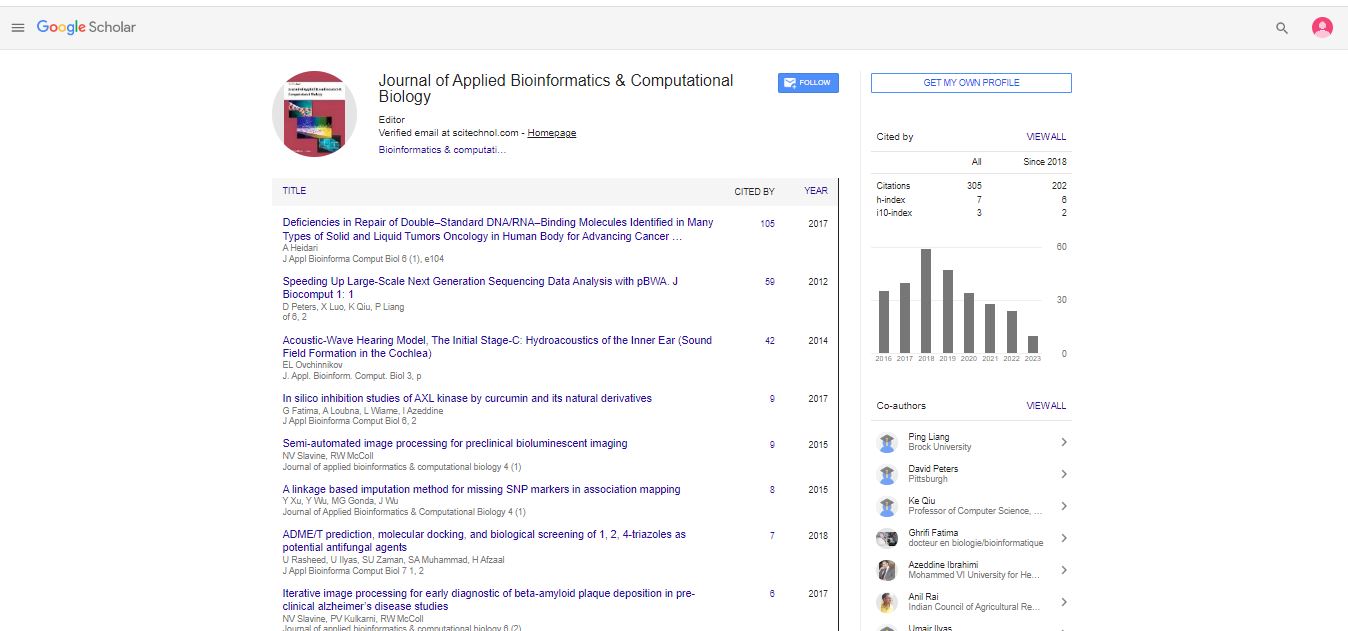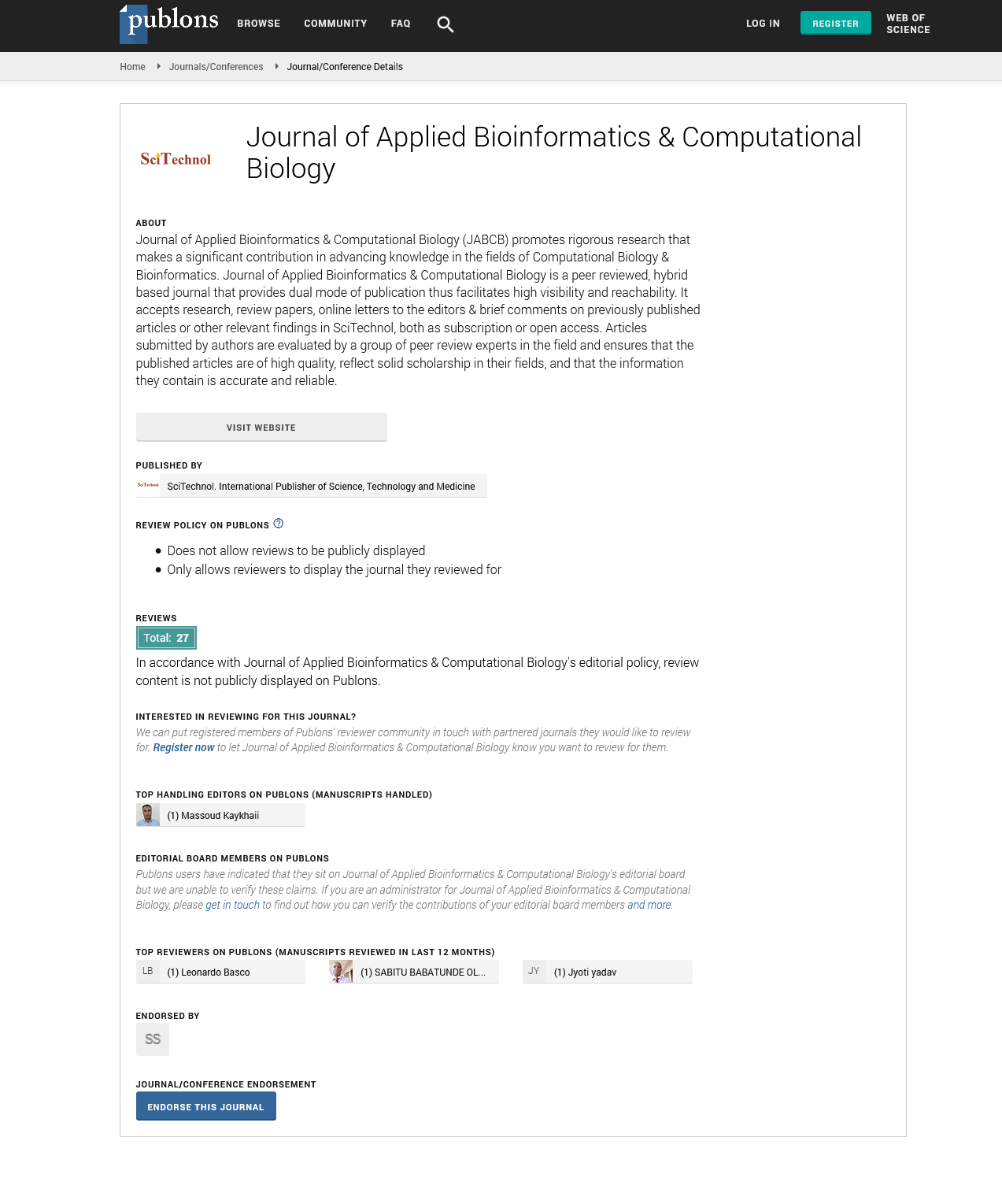Opinion Article, J Appl Bioinformat Computat Biol S Vol: 0 Issue: 0
Application of Machine Learning Tools to Screening of A Large Preclinical Systematic Review
Grace Allan*
Department of Biology, University of Wurzburg, Am Hubland, 97074 Wurzburg, Germany
*Corresponding Author: Grace Allan
Department of Biology, University of Wurzburg
Am Hubland 97074 Wurzburg, Germany
E-mail: allang@uniwuerzburg. de
Received: October 06, 2021 Accepted: October 20, 2021 Published: October 27, 2021
Citation:Allan G (2021) Application of Machine Learning Tools to Screening of A Large Preclinical Systematic Review. J Appl Bioinforma Comput Biol S4.
Abstract
Preclinical deliberate audits (SRs) and meta-examinations (MAs) are significant exploration exercises to address the translational difficulties of agony research. Deliberate audits give exact proof to acquire information, illuminate future exploration plans, and award applications simultaneous to fostering specialists’ expert abilities. Preclinical SRs offer a system by which the reach and nature of the proof can be evaluated, to further develop study design, meticulousness, and announcing. They sum up the information into a straightforward organization related to recognizing holes in the information base in this manner giving the legitimization to raising financing for new examinations.
Keywords: DrugReceptor Interactions, Computational Approach
Keywords
Machine Learning Tools; Preclinical Systematic Review
Introduction
Artificial Intelligence ways to deal with a wide precise survey of creature models of discouragement at the reference screening stage. We tried two autonomously created Machine Learning approaches which utilized diverse order models and capabilities. We recorded the presentation of the Machine Learning approaches on an inconspicuous approval set of papers utilizing affectability, explicitness and precision.
The utilization of text-mining instruments and Machine Learning calculations to help orderly survey is turning into an inexorably well-known way to deal with diminish human weight and money related assets required and to lessen the time taken to finish such audits [1-3]. AI calculations are essentially utilized at the screening stage in the methodical audit process. This screening stage includes arranging records recognized from the pursuit into ‘applicable’ or ‘not-pertinent’ to the exploration question, commonly performed by two free human commentators with disparities accommodated by a third. This choice is ordinarily made based on the title and unique of an article in the main example. In past experience at CAMARADES (Collaborative Approach to Meta-Analysis and Review of Animal Data from Experimental Studies), screening a preclinical methodical audit with 33,184 novel query items took 9 months, addressing (due to double screening) around 18 man a long time altogether. In view of on this, we gauge that an efficient audit with around 10,000 distributions recovered takes at least 40 weeks. In clinical precise audits, Borah and associates [4] showed the normal clinical efficient survey enlisted on PROSPERO (International Prospective Register of Systematic Reviews) takes a normal 67.3 weeks to finish. AI calculations can be utilized to become familiar with this categorisation capacity, in view of preparing cases that have been screened by human analysts.
A few uses of Machine Learning are conceivable. The most untroublesome is the point at which an audit is being refreshed, where categorisations from the first survey are utilized to prepare a classifier, which is then applied to new records recognized in the refreshed hunt [5]. At the point when a screening is performed again, without such past assortment, people initially arrange an underlying arrangement of search returns, which are utilized to prepare a Machine Learning model. The presentation of the model is then tried (either in an approval set or with k crease cross approval); on the off chance that exhibition doesn’t meet a necessary edge, more records are screened, picked either through irregular testing or, utilizing dynamic learning, on the premise both of those with most noteworthy vulnerability of expectations or on the other hand from those probably going to be incorporated. Here, we utilize an anew search with ensuing preparing sets distinguished by arbitrary inspecting, and we present a clever utilization of machine expectation in recognizing human blunder in screening choices.
AI approaches have been assessed in setting of methodical surveys of a few clinical issues including drug class adequacy appraisal, hereditary affiliations, General wellbeing. Cost-adequacy investigations, toxicology treatment viability and sustenance. As far as we could possibly know, there have been just two endeavors to apply such procedures to audits of preclinical creature examines. These can be wide and shallow audits or focussed and definite surveys and can have fluctuating commonness of incorporation.
References
- Howard BE, Phillips J, Miller K, Tandon A, Mav D et al. (2016) SWIFT-review: a text-mining workbench for systematic review. Syst Rev 5:87
- Tsafnat G, Glasziou P, Choong MK, Dunn A, Galgani F (2014) Systematic review automation technologies. Syst Rev 3:74
- Mara-Eves A, Thomas J, McNaught J, Miwa M, Ananiadou S (2015) Using text mining for study identification in systematic reviews: a systematic review of current approaches. Syst Rev 4:5
- Borah R, Brown AW, Capers PL (2017) Analysis of the time and workers needed to conduct systematic reviews of medical interventions using data from the PROSPERO registry. BMJ Open 7:012545.
- Cohen AM, Ambert K, McDonagh M (2012) Studying the potential impact of automated document classification on scheduling a systematic review update. BMC Med Inform Decis Mak 12:33
 Spanish
Spanish  Chinese
Chinese  Russian
Russian  German
German  French
French  Japanese
Japanese  Portuguese
Portuguese  Hindi
Hindi 
